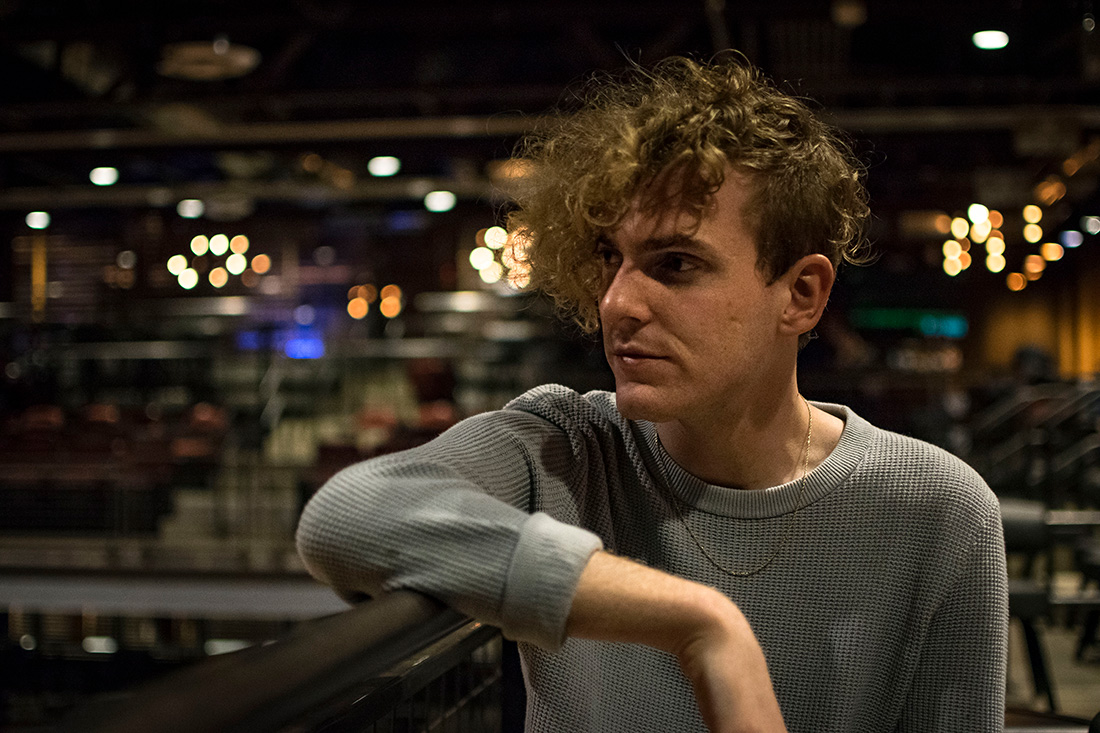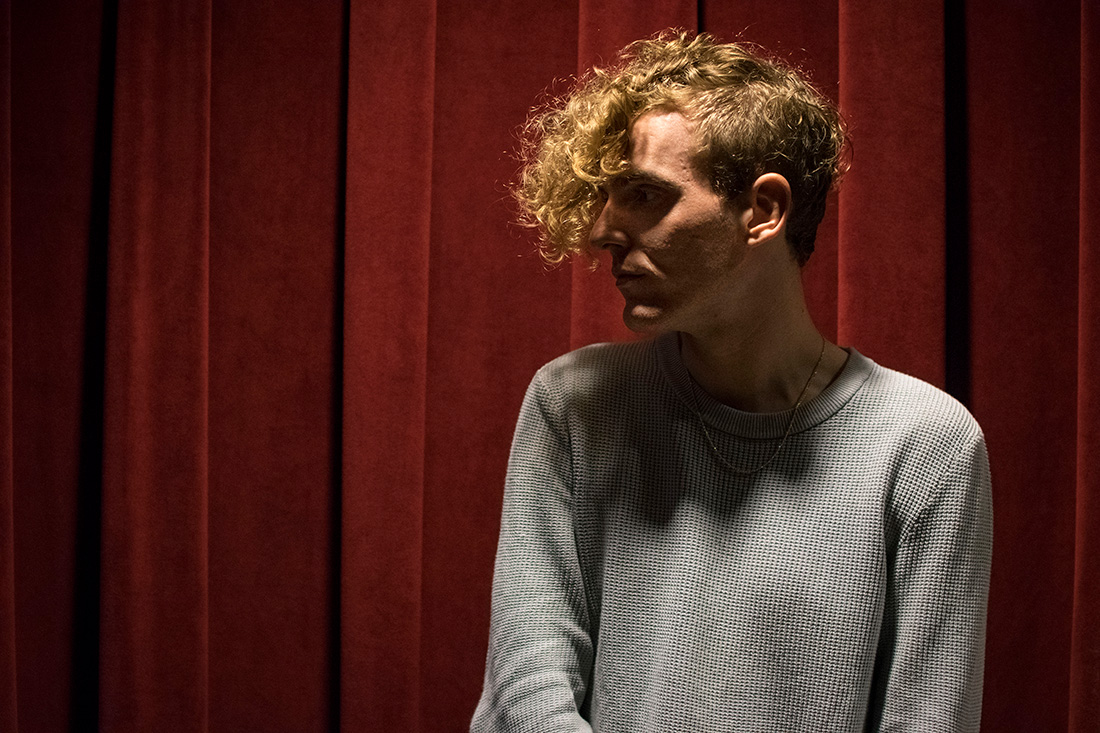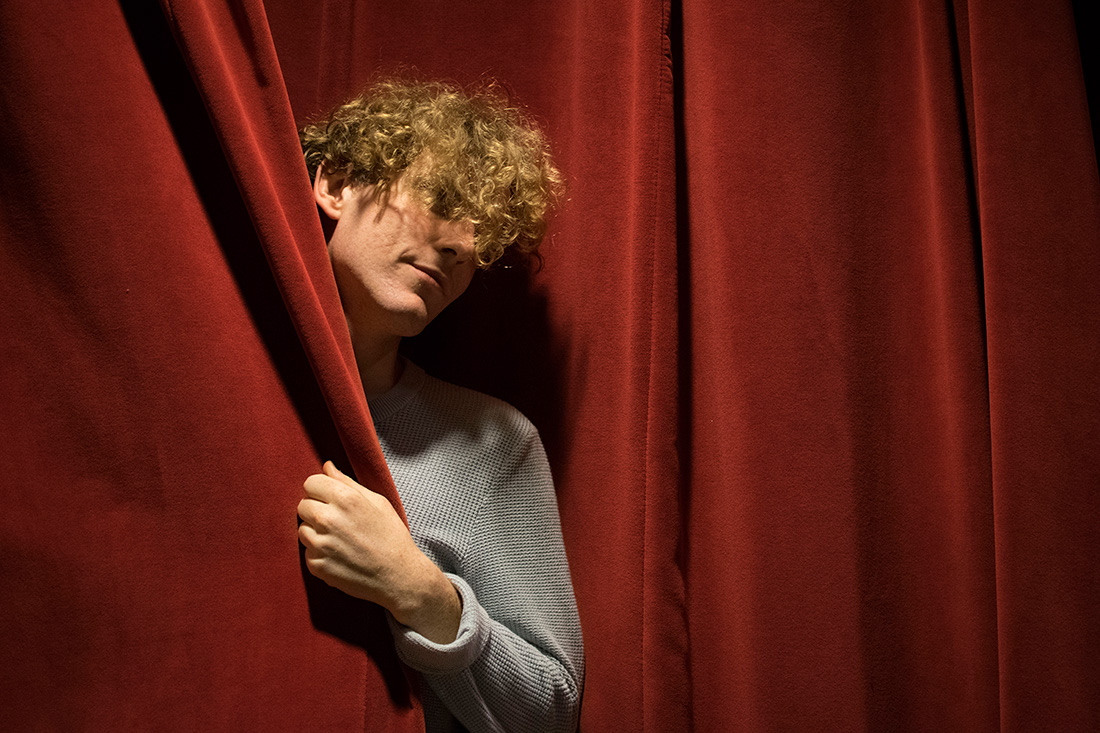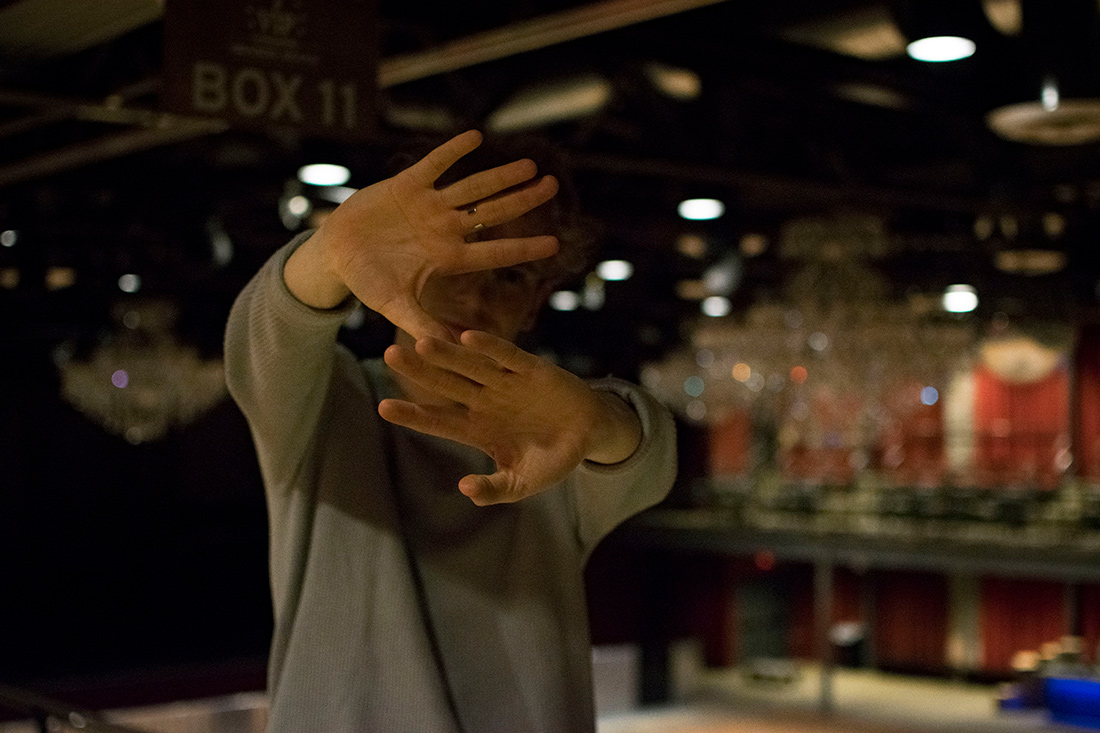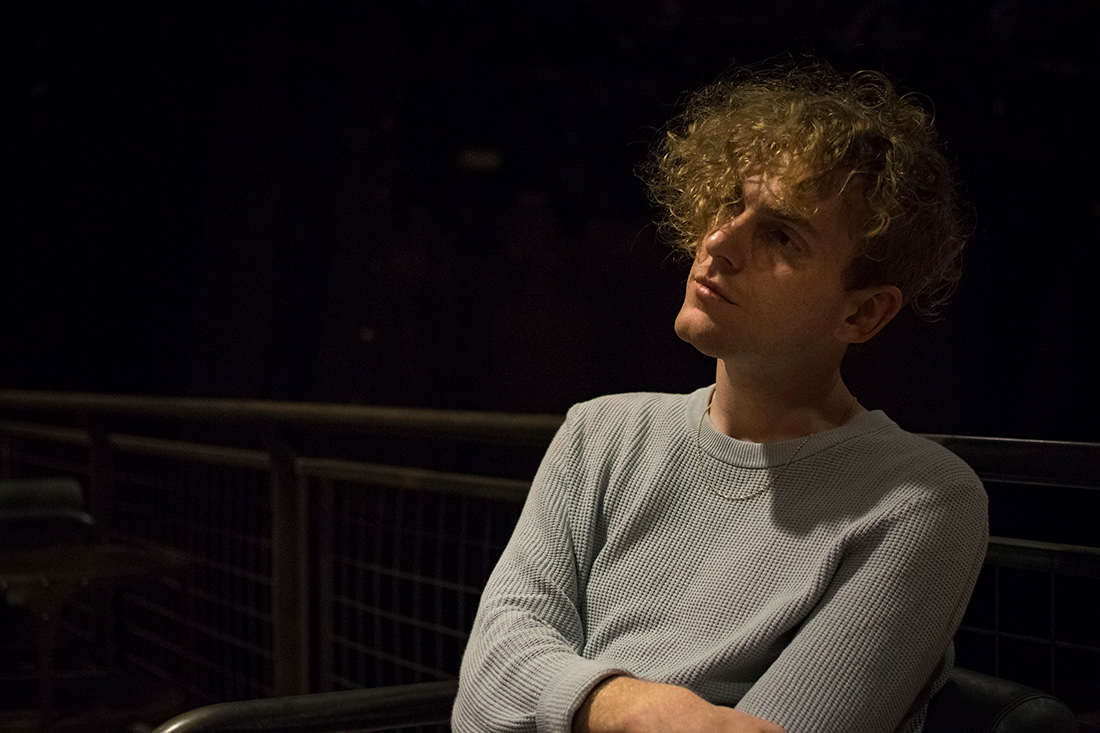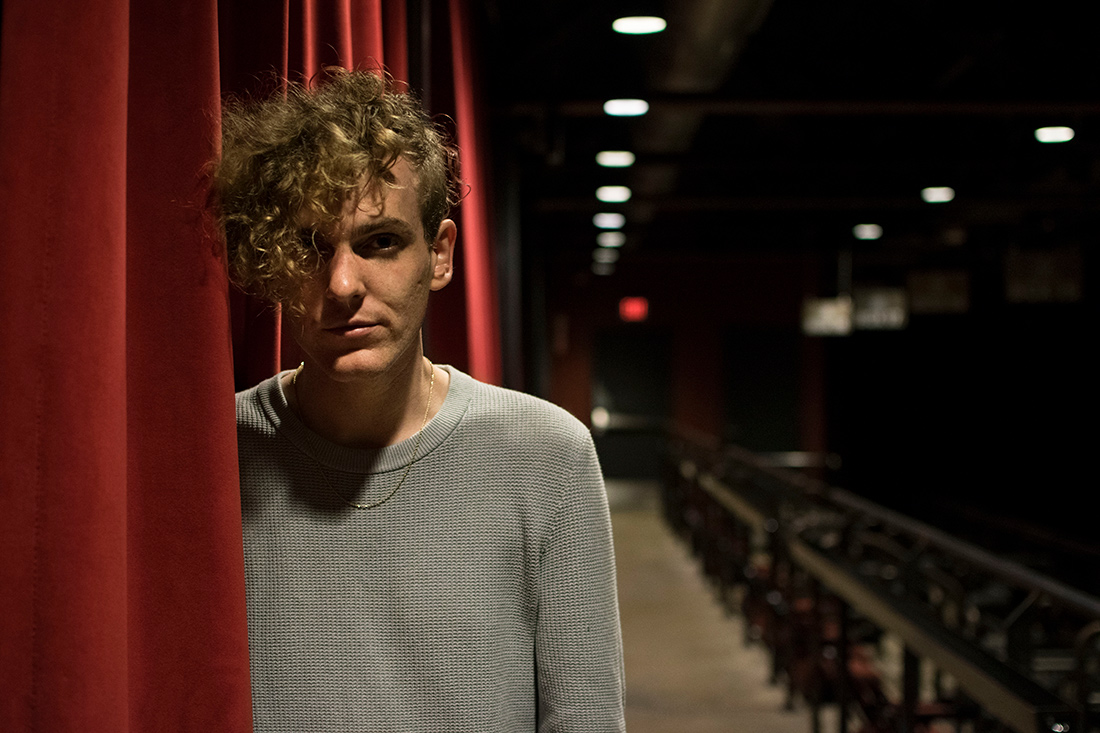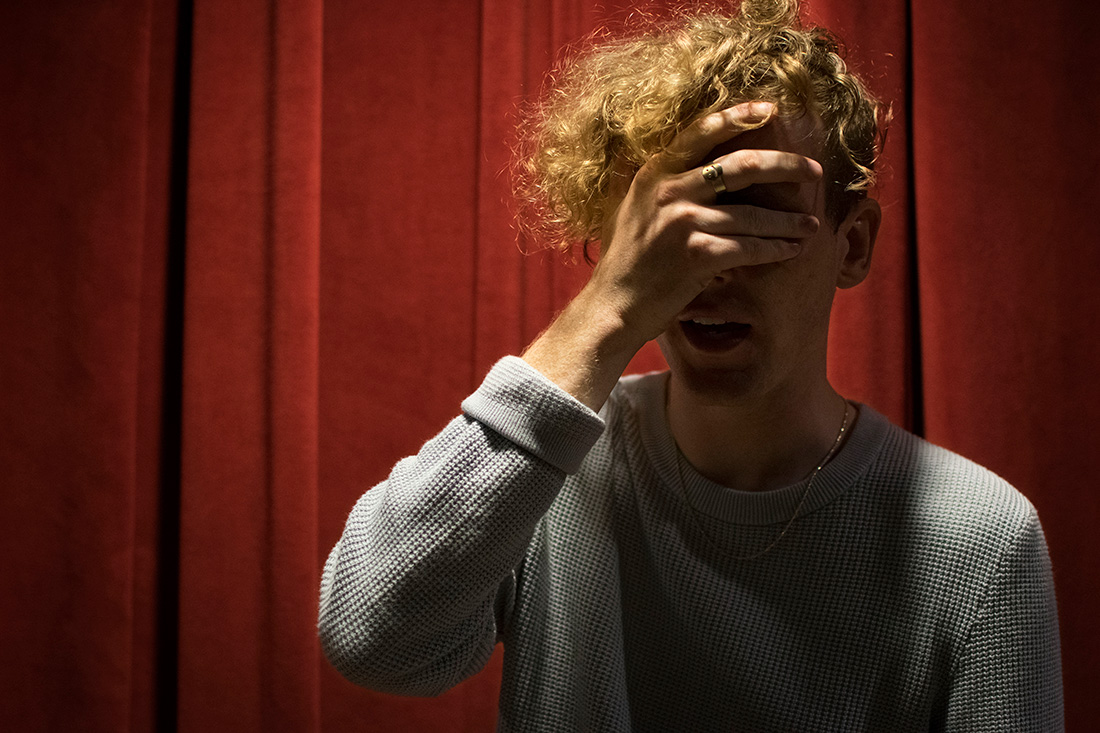Coming together at Belmont University, the talent of Nashville indie pop band COIN became very apparent, very fast. A colorful splash in what was at the time a sea of garage rock and country, the quartet quickly broke out of their local scene and attracted the attention of key industry players. Fast-forward to present day and they’re out on tour supporting album number two. The forty-minute body of work shines with pop brilliance and bangs with alternative sensibilities – and it’s so true to where they are right now, frontman Chase Lawrence considers it in essence to be their debut album.
Interview and Photography by Andy Gorel
Andy: Growing up, when did you realize that music was your passion, and that it was something you wanted to pursue?
Chase: I was in sixth grade. My dad is a songwriter so I grew up with the idea that music was a possibility to pursue as a career – like always a real thing. When I was in sixth grade I realized every song on the radio was the same four chords, and then I started putting those four chords together by myself. I wrote my first song in sixth grade. That’s when I realized that I could do something. I don’t know. I don’t know if there was really a definitive moment for me. It was very gradual.
Probably not until I moved to Nashville. Which was like four years ago. That’s when I realized, “Ok. I’m diving in. I’m going for it.”
Ryan: About 12-13. Pivotal. Just going to shows, that’s when it really started. That’s when I really got serious. Seeing an example of it and seeing that it’s a career option is the coolest thing when you’re a kid.
Andy: COIN formed at Belmont University in Nashville. What were you studying there, and how do you think those years helped you find yourself as an artist and writer?
Chase: I studied songwriting. I got a Bachelor’s of Science in the science of songwriting – I mean whatever. You can’t teach someone how to write a great song. They just forced me to create, and to write for my degree basically. So over those years I was forced to write and out of those years, that’s where a lot of the first COIN songs came from – just finishing school assignments. In those years it was amazing to be around such an amazing community of people. It wasn’t competitive fortunately. Maybe it is now, but at the time it was very nurturing, and everyone was kind of doing their own thing, and were happy for everyone when they saw success. It was kind of cool. It was like iron sharpening iron at that point. I can’t really attest to what it’s like now.
“As far as artistry goes, we’re super inspired by bands like The Cure, The Cars – bands like that who’ve had amazing careers, and still morphed over the years.”
Andy: Who have been your biggest influences as a songwriter and/or artist?
Joe: I would say Ric Ocasek for me.
Chase: We have this book of every Ric Ocasek song. Every Cars song. In the back there is all this prose he’s written.
Ryan: David Byrne
Chase: Yeah, David Byrne too. When we were writing the first album especially, we would just get online and read prose by David Byrne. Just read through lyrics and absorb it before we started writing. I’m also super inspired by Ezra Koenig’s writing. He’s a huge influence on me. I just love how verbose he is with his words.
As far as artistry goes, we’re super inspired by bands like The Cure, The Cars – bands like that who’ve had amazing careers, and still morphed over the years.
Andy: What about Nashville as a scene? It seems to be very supportive.
Chase: It’s so supportive. It’s crazy.
Andy: How do you feel as a pop band coming out of there where it’s a very indie rock oriented scene?
Chase: Seemingly there’s a lot of indie pop there, when you’re there, but a lot of it stays within the walls of Nashville.
Ryan: When we started our band there wasn’t. So we’re seeing more of it now, and it makes us excited, because when we first started the band it was all country, and then this wave of grungy, or garage rock – blues rock like The Black Keys, bands like that. At the time we felt like an outlier, and now we feel like it’s growing. The scene’s growing and we love to see that.
Chase: Even to the point where country and rock are both starting to shift towards pop.
Andy: Yeah, Pop is a very serious thing right now which is kinda cool. I feel the perception was cheesy and tacky for a while, but now it’s a space that’s being taken so seriously. You can create something that’s pop, but it’s still artistic, and the music nerds will even get behind it.
Ryan: Even songwriters are becoming celebrities now. It’s crazy. People who used to just be behind closed doors.
Joe: Yeah, there are people who don’t want to let it slip to complete death. You know?
Andy: So while you guys were in school you released your first EP, 1992. Where did the initial inspiration to start COIN come from, and who influenced the band’s sound in its formative days?
Chase: Off the top, there was an EP before that called “Saturdays”. Basically we were really influenced by Passion Pit, Two Door Cinema Club, Grizzly Bear, Young the Giant – bands that were –
Andy: Well you started in like 2012 so that’s when bands like that were popping off.
Chase: Exactly. Not even popping off yet. There were on the cusp of being big bands.
Joe: Those were the pop bands at the time.
Chase: We were so inspired and it was amazing to see them in small clubs – inspiring this wave and sound as they went. Moving on, we learned what they were inspired by. We dove deeper into their influences, and their influences influences. And now we’re listening to black metal [laughs]. Just kidding.
Andy: What about the writing and recording process for 1992? Was it completely DIY?
Chase: Well the Saturdays EP was DIY. We used a Belmont studio and our friends helped us. We paid this dude $300 to mix it. He just believed in it. We’re fortunate to have found a lot of people that just believed in us from the start. And we’ve found that that’s not the case all the time. Even we find people now who won’t do us favors.
He mixed it for $300 then for 1992 it was still DIY, but our friend – basically our dad friend – who also does music as a songwriter helped us shape and record the songs. Zach helped record them. He played the producer role. He let us use his studio, and again, did it for $1000. And then our friend mixed it for like $250 [laughs].
Ryan: Everything was like $300 at the time.
“I guess we just had one of those once in a lifetime shows. The next morning – we didn’t even think we were gonna meet with record labels or anything – we were on the 35th floor of the Madison building.”
Andy: So self-titled was released on Columbia. What made you guys decide to go the major label route, and in general choose Columbia?
Chase: Honestly, Columbia chose us. In the fall of 2013, our A&R Isaac Green saw us at Brooklyn Bowl – CMJ. We had just gotten a manager and played this showcase at Brooklyn Bowl, and I guess we just had one of those once in a lifetime shows. The next morning – we didn’t even think we were gonna meet with record labels or anything – we were on the 35th floor of the Madison building.
Isaac kind of found us. We were definitely searching for some release partner for the future, but they came at such an early time that it was developmental. I think Isaac and Columbia helped shape us. So we don’t know anything else but that. It’s not like we were seeking out some major label lucrative deal. They just wanted to come in at an early time. We were not ready. We did not have the material. It took us a full year, and they connected us with the right producer and the right people to help shape our first album.
Andy: On that album was a song called “Lately” and now on this album there’s a song called “Lately II,” do you want to talk about the meaning of both of them, and how they serve as part 1 and 2 to each other?
Chase: “Lately” is about losing my nephew and it’s told from the perspective of my sister, and what she went through. “Lately II” is about the same day but it’s told from the perspective of my brother-in-law. There’s a hidden track on “Lately II” which is my perspective from that day. And we actually had to play a show that night. I had to drive to meet the band in Cincinnati, and I was going 100 mph crying my eyes out. One day there’s going to be like “Lately Pt. 17” [laughs]. I could talk about that day for years, and it deserves to be talked about.
“We exude what we exude. We do what we do. It’s taken us a long time to get comfortable with that. Maybe in the past we’ve fallen into the trap of our influences, but I think now more than ever we’re just doing what comes naturally.”
Andy: Both lyrically, musically, and visually your songs seem to have this warmth of the late 90s, and 00s to them. Is there a time period you feel COIN is derivative of?
Chase: No. We exude what we exude. We do what we do. It’s taken us a long time to get comfortable with that. Maybe in the past we’ve fallen into the trap of our influences, but I think now more than ever we’re just doing what comes naturally.
Andy: That’s the goal. To get to that point.
Chase: Obviously we’re still moving towards it every day. I think it was Theodore Roosevelt said “Comparison is the thief of joy.” We’re just trying to avoid that as much as possible.
Andy: You’ve mentioned before that the song “Atlas” is about Y2K. Where was the inspiration for that one from?
Chase: Everyone thought the world was ending. I remember sitting in church on New Years Eve, and I was so positive the world was gonna end. I had a G.I. Joe in my hand. I was ready for the world to end. It’s about that day, and not necessarily my experience, but someone’s experience from that era.
Andy: You guys pay very close attention to aesthetics and your brand. Where would you say the inspiration for your aesthetics and visuals comes from?
Chase: Again, we’re just doing what we think looks nice.
Ryan: A lot of thought goes into that.
Chase: It’s a combination of a lot of things. I can go into my phone – I take photos of everything – it’s a combination of experience – I sit in art magazine shops or art stores, book stores whatever, and just take photos of books, or buy books. We’re inspired by all different things.
Ryan: Photography, Fashion. All of it plays into “this would be a cool thing for us.”
Chase: It’s like lifting from whatever other culture there is, and bringing it into music – bringing it into our world. Spinning it through our lens.
Andy: So you guys have “Red Velvet under pressure” as a line in “Talk Too Much”, and that’s been a branding scheme of yours lately – the red velvet. Are the two related?
Chase: No. They’re not actually.
Andy: Talk Too Much was released long before the album was, and really set the groundwork for this album.
Chase: Yeah, tomorrow it turns a year old actually!
“We wanted to flip this whole COIN thing on its head and try a different approach.”
Andy: There you go. It was a long period of time for a lead single. What was it like writing that song? Were you immediately like, guys, we need to put this out right now?
Chase: Yeah. We wanted to flip this whole COIN thing on its head and try a different approach. Obviously we did some songs with the classic COIN approach on this album, but for this one we were like let’s just try something totally different. So we listened to that song “Need You Tonight” by INXS on our first day of writing in LA.
Joe: And that Charli XCX song too – “Famous.”
Andy: Great song. That whole album is amazing.
Chase: Yeah. So good.
Joe: The guitar riff at the beginning.
Chase: Yeah, it’s kinda like INXS! It’s very similar.
Andy: With the exception of a few tracks produced by Andrew Maury, and a few produced by Tim Pagnotta, you self-produced a good portion of it. What was the process like working with both of those insanely talented producers, and also doing a lot of it yourself?
Chase: We self-produced five of them.
Zach: It was a challenging process. We’d never had that much available gear cause we’d actually rented out a proper studio to work in on our own. It was really fun to have options, but we didn’t have a lot of time unfortunately. We were on a time crunch. We had like a week to do five songs.
Chase: We dove in head first and experimented with stuff that maybe we would feel embarrassed to go on tangents that maybe Tim would be like “This is a waste of my time.” Not that he would ever do that, but we could start going with crazy effects and things that we’re entertained by, but maybe somebody who it isn’t their project would be like “You guys are crazy. You’re on you’re own.” [laughs]. We were able to explore things a little more even though we did it in about two weeks.
With Tim, he’s super direct, and we work really well together, but the songs kind of sound sunnier and brighter.
Andy: Were “Boyfriend” and “Heart Eyes”, self-produced?
Chase: “Boyfriend” was with Tim. But actually, the “Boyfriend” demo was very close to the master. That’s what Tim does though, he makes better versions of what we make on our own.
“Heart Eyes” is very much produced by us. That was the hardest song to record probably. It went through like four different versions, tempo changes, and then at the last second it was just like [imitates intro lead guitar riff], and we were like “That sounds cool, let’s do that,” [laughs].
Zach: How many times did we record vocals for that song?
Joe: [Laughs] Oh man!!
Chase: Six. Six separate times. We recorded it three different times in New York too. Maybe seven. It was a lot. It took a lot of tries to find the right one. Cause I was so sick – and to find the right authenticity for it, because that song means a lot to me. That song means a lot to me, and I wanted to make it feel right.
Andy: I think it’s a nice change of pace for you guys.
Chase: Thank you! That’s really where we want to go a little more. We love bands like Joy Division… that droney sounding thing.
“This album was very much a culmination of personal experience that we all went through. Musically, lyrically, everything is super specific to us.”
Andy: Where did the inspiration for the songs on this new album come from?
Chase: Personal experience. Which is atypical from the first album more so. This album was very much a culmination of personal experience that we all went through. Musically, lyrically, everything is super specific to us.
Andy: Do you feel you’re in a much different place than you were when writing the first album?
Joe: [Laughs] Just different people dude. Just so different.
Chase: Yeah, night and day truly. I don’t even know. We’re such different people.
Joe: It would take hours to explain.
Ryan: I think simply though, we weren’t writing for an album for the first album because it was just all the songs that we’d made to date, that we put on an album. We were like “I guess ten songs is ten songs right?” And then just put ‘em on an album. This one was a longer process for a goal.
Zach: They say you have your entire life to write your first album…
Chase: But we just had college basically. Not even three years. I think we had less time to write the first album than we did the second album which is really funny. Or maybe not less time, but it was our own timeframe.
Andy: Well you may have had less of a direction or a goal in mind.
Chase: True. Yeah, that’s a very good way to put it. We just didn’t know what we wanted to do. We were to the point where we would listen to Cure songs and be like, “Why doesn’t this sound like that?” [laughs].
Andy: So we talked about “Malibu.” You brought “Malibu” back for the new album. Same recording, new mix. What made you want to do this?
Chase: Well it was supposed to be on the first album.
Joe: We really wanted to put it on the first album. We just didn’t have enough time with the producer.
Chase: And it was kinda just gone for good. It came on shuffle on my phone. I was in an airport and I listened to it. I started crying – it’s so stupid [laughs]. Then I realized that I had myself more figured out even than I do now. Three years ago when I wrote it. What did you say earlier today Zach?
Zach: The more you learn the less you know.
Chase: The more you learn the less you know. It just felt like we went into this whole album following our instincts, and doing what we wanted to do naturally – be carefree about it. And we were like this is the perfect way to end this era of COIN – with this song. We weren’t even thinking twice about it three years ago.
Andy: So what’s the whole “Don’t Cry, 2020” – “Malibu, 1992” 28 years mean? Were you born in ‘92?
Chase: Everyone except me was actually. It will make sense eventually. It’s conceptual.
“I’ve learned how to better express my emotions and understand how to communicate, and love others a lot more. I think I want to make music that exemplifies that. We all do.”
Andy: So as a whole, in what way do you see this album as the next chapter of COIN?
Chase: In a way, this is almost our debut album. The first album is kinda like a long EP if it makes sense. I don’t know if that makes sense at all.
Joe: No that’s exactly what it is.
Chase: So this chapter, it’s just so much more uniquely us. I can’t put my finger on it. It’s at least very true to where we are. And the first album, it may have been the case at the time, but this album is so where we are – I don’t know if I’m growing up.
Joe: More so just doing what feels good, and thinking less about being cool.
Chase: I feel like I was so callous at the first album too for some reason – with myself. I’ve learned how to better express my emotions and understand how to communicate, and love others a lot more. I think I want to make music that exemplifies that. We all do.
Andy: Well personally, I loved a lot of stuff on the first one but immediately when I heard this album I thought it was definitely a step up.
Zach: Yeah, we’re all with you there.
Chase: I completely agree. All we can ask for is to be better. We can’t reinvent ourselves and change over night. All we can ask for is to do something better, and I really appreciate you saying that.
Joe: Yeah, we just want to keep being better than the last one.
Andy: Yeah, that’s the goal. Just keep getting better. Then you peak. And then nobody wants to listen to you anymore.
[Laughs from everyone]Chase: Yeah, we make a lateral move, and then we just shave our heads, and then leave [laughs].


